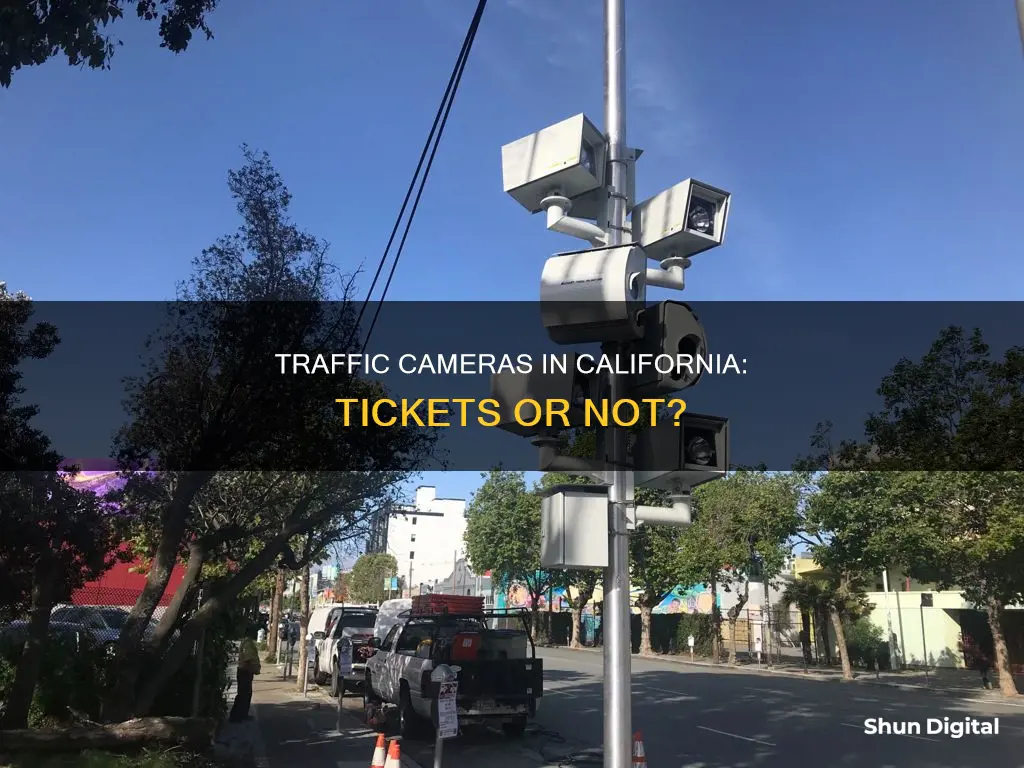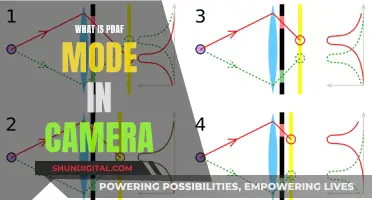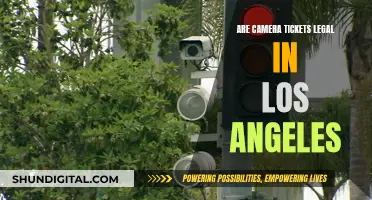
Traffic cameras are an increasingly common feature of American roads, and they are designed to improve safety and reduce accidents by capturing reckless drivers. In California, these cameras are often installed and run by third-party companies, and they are triggered by sensors when a vehicle passes through an intersection during a red light. The cameras then snap a photo of the license plate and driver, and a ticket is mailed to the registered owner of the vehicle. While these tickets can be contested and dismissed, they can also result in hefty fines and points on your driving record if ignored. So, it is essential for drivers to understand their rights and options when it comes to these automated traffic enforcement systems.
| Characteristics | Values |
|---|---|
| Purpose | Safety, reducing accidents caused by out-of-control drivers |
| Ticket triggers | Sensors, induction loops, laser, radar, air-tube sensors, video loops |
| Ticket requirements | Clear picture of driver and license plate |
| Ticket issuer | Third-party companies, not the city |
| Ticket fine | $100 minimum, $400 with added fees |
| Ticket response | Fight, dismiss, or ignore |
| Ticket consequences | Points on driving record, higher insurance rates, license suspension, additional fines |
What You'll Learn

Red light cameras are triggered by sensors
Red light cameras are an effective way to enforce traffic laws and reduce accidents. They are triggered by sensors that detect vehicles passing over the stop line when the light is red. This technology is known as an induction loop, an electrical wire beneath the asphalt.
In California, these sensors are placed in Los Angeles and other cities to capture law violators. When a vehicle passes over the sensor, the camera snaps a photo of the license plate and the driver, and a ticket is mailed to the registered owner. The ticket includes the fine amount, photo evidence, a copy of the citation, and information on challenging the ticket.
It's important to note that red light cameras in California are often managed by third-party companies, who may be motivated to issue tickets to meet contractual obligations. As a result, drivers may receive unwarranted tickets, and it is essential to carefully review the information provided.
While the induction loop is the most common form of sensor technology, other types of sensors are also used in red light cameras. These include laser, radar, air-tube sensors, and video loops. These sensors work together with the cameras to capture evidence of traffic violations, helping to improve road safety and deter drivers from running red lights.
Lithium-Ion Camera Batteries: Powering Your Photography
You may want to see also

Third-party companies operate most red light cameras
In California, red light cameras are usually operated by third-party companies and not the city. These companies are often contractually obligated to meet a minimum number of recorded violations. This means that vehicle owners may receive unwarranted tickets.
Red light cameras are fully automatic and are able to collect the necessary information to prosecute those who run red lights. There is a sensor that is triggered when a vehicle passes through the intersection once the light turns red. The most common form of technology used is an induction loop, an electrical wire underneath the asphalt. However, there are many different types of sensors used, including laser, radar, air-tube sensors, and video loops.
It is common for a driver to notice the bright flash when the automatic picture is taken. There are often multiple cameras positioned at the corners of an intersection to allow photographs from different angles to be taken simultaneously and for pictures to be taken as the vehicle enters the intersection and once it reaches the middle.
The system only turns on once it is signaled, which is once the light turns red. The system won't activate if the vehicle is already in the middle of the intersection when it receives the signal that the light has turned red. Some systems don't activate until a fraction of a second after the light turns red, which can result in a tiny "grace period".
The computer applies a date and time stamp to the pictures, noting the intersection location and the speed of the car. The time between the moment the light turned red and when the vehicle entered the intersection is also recorded. The picture, along with the ticket, will be mailed to the registered owner of the vehicle within a month or two.
The base fines for running a red light in California are as follows:
- $35 for making an illegal right turn at a red light
- $35 for running a stop sign
- $100 for running a red light or flashing red light
However, there are a variety of fees and surcharges that are added to the base fine. The fees will vary based on the county and city that the violation occurred in. Although the value of the fines starts at $35, it is not unheard of for a ticket for these types of violations to reach a value of $400 or $500 or more.
Instax Mini 8: Unveiling the Manufacturing Story
You may want to see also

Red light camera fines start at $35
In California, fines for traffic violations usually include a base fine plus a number of additional fees and surcharges. The base fines for red light and stop sign violations in California are as follows:
- $100 for running straight through a solid or flashing red light
- $35 for making an illegal right turn at a red light
- $35 for running a stop sign
These base fines can be used as a standard starting point, but the total fine amount can increase substantially. Although fines start at $35, it is not unheard of for a ticket for these types of violations to reach a value of $400 or even $500. This is because there are a variety of fees and surcharges that are added to the base fine, which will vary based on the county and city that the violation occurred in.
In addition to fines, drivers who run a red light or stop sign in California will also receive demerit points on their driving record. Acquiring too many points can lead to a license suspension. However, this red light violation point can be avoided by completing a course through a California traffic school.
ONA Camera Bags: Where Are They Made?
You may want to see also

Red light camera tickets can be lowered, dismissed, or ignored
Red light camera tickets are triggered by sensors when a vehicle passes through an intersection once the light turns red. The camera then takes a photo of the license plate and the driver, and a ticket is mailed to the registered owner of the vehicle. While it is important to respond promptly when you receive a red light camera ticket, there are several ways to lower, dismiss, or ignore it.
Firstly, red light camera tickets can be lowered. The fines for red light violations in California include a base fine plus additional fees and surcharges. The base fines are $35 for making an illegal right turn at a red light or running a stop sign, and $100 for running straight through a solid or flashing red light. However, the total fine amount can be lowered as these fees and surcharges are variable.
Red light camera tickets can also be dismissed. For example, if you were not the one driving the vehicle at the time of the violation, you are not responsible for paying the ticket. In this case, you must submit an affidavit form to provide the name and address of the person who was driving. Additionally, if there are no warning signs posted within 200 feet of the intersection, or if the yellow light interval is shorter than the minimum required time, you may be able to get the ticket dismissed.
Finally, while it is risky to ignore a red light camera ticket, it is possible to do so. The L.A. County Superior Court ruled that failure to pay a red-light camera ticket cannot be reported to the DMV, and the California state DMV changed its policy and no longer suspends licenses for unpaid red light tickets. However, ignoring a red light camera ticket can lead to consequences such as higher insurance rates, license suspension, and additional fines. Therefore, it is recommended to respond to your tickets or notices on time.
The Ultimate Guide to Charging Your Doorbell Camera
You may want to see also

Red light camera tickets can affect your insurance
In California, running a stop sign or red light will typically result in a fine and demerit points on your driving record. Many locations throughout the state have installed red light cameras to capture law violators. These cameras are fully automatic and are able to collect the necessary information to prosecute those who run red lights. When a vehicle passes over a sensor, the camera snaps a photo of the license plate and the driver. The ticket, along with the photo evidence, is then mailed to the registered owner of the vehicle.
It's important to note that not all states treat red light camera tickets in the same way. In some states, these tickets are classified as non-moving offenses, similar to parking tickets, and do not affect insurance rates. However, in other states, such as Arizona, California, and Oregon, red light camera tickets result in points being added to your license, which can lead to higher insurance premiums.
If you receive a red light camera ticket, it is recommended to review the information carefully and respond promptly. You may also have the option to fight the ticket or consult with a legal expert to explore your options.
Lumix GX85: Does It Have a Macro Mode?
You may want to see also
Frequently asked questions
Sensors are triggered when a vehicle passes through an intersection once the light turns red. The camera then takes a photo of the license plate and the driver. The ticket, along with the photo evidence, will be mailed to the registered owner of the vehicle.
While some sources advise against ignoring a red light camera ticket, others state that if you do nothing, it will not interfere with your driver's license or delay a renewal as a lack of response is not reported to the DMV. However, you may receive a letter from a collection agency demanding payment.
The base fines for running a red light in California are: $35 for an illegal right turn, $35 for running a stop sign, and $100 for running a red light. However, there are additional fees and surcharges, and the total fine amount can reach $400 or more.
A red light camera ticket will add one point to your driving record, which can increase your insurance rates. Acquiring too many points can lead to a license suspension. Completing a course through a California traffic school can help you avoid this.
Yes, all types of tickets can be beaten in traffic court, and it is recommended to seek the help of a legal expert.







